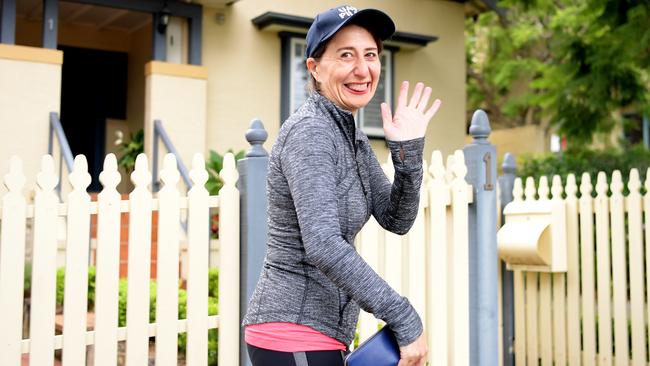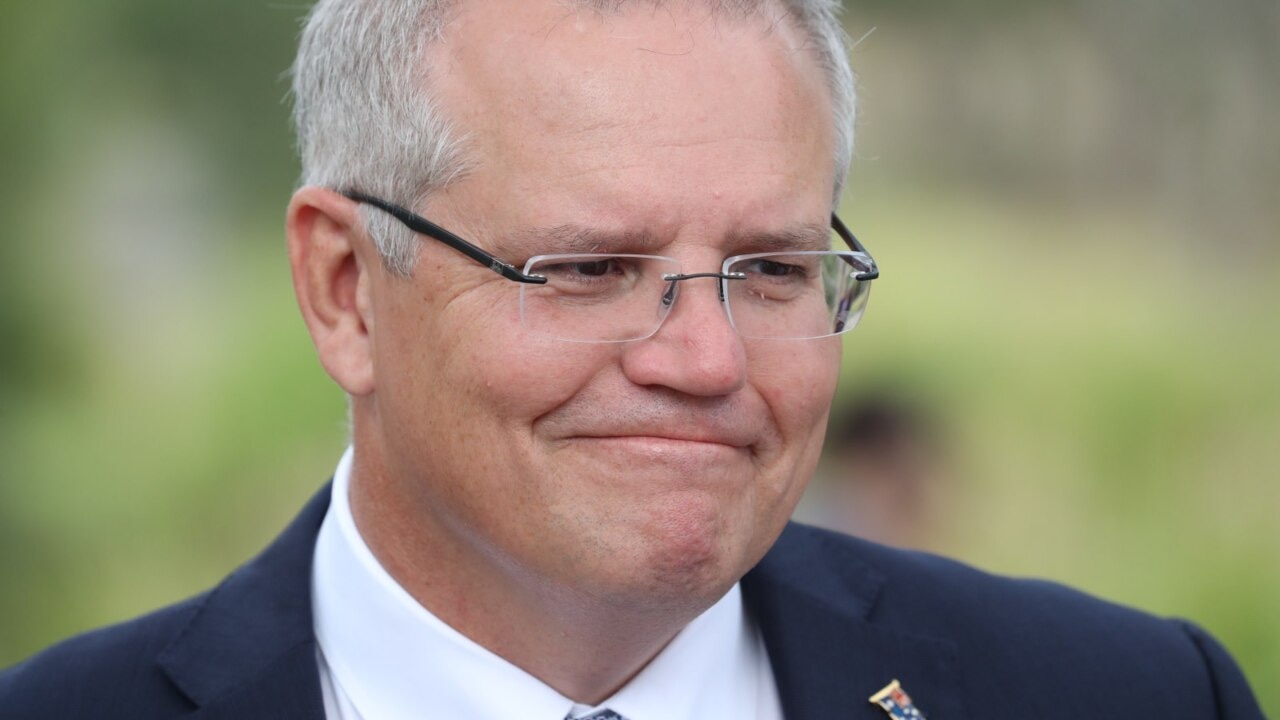Berejiklian victory has Morrison eyeing federal poll on May 11
After Gladys Berejiklian’s victory in NSW, Scott Morrison begins his quest to win back the bush for the federal election.

An infrastructure boon for regional and rural Australia will form a centrepiece of Scott Morrison’s quest to win back the bush as Liberal strategists prepare for a May 11 federal election to be called on the Sunday immediately following the April 2 budget.
With the Nationals now in crisis talks following the loss of two key seats at the weekend’s NSW election, senior federal government sources have confirmed that a “significant” economic package for the bush has already been locked into the federal budget.
The re-election of the Berejiklian government has delivered a morale boost for city-based federal Liberal MPs, but an exclusive Newspoll analysis has confirmed one of the key warnings to emerge from the poll — that the federal Coalition is facing a crumbling of popular support to right-wing minor parties in the regions.
Gladys Berejiklian’s historic victory was underpinned by a stronger than expected primary vote of 42.7 per cent, which is likely to see the Coalition form a majority government by up to two seats.
Mobile users click here to see graphic
But while Labor picked up just one additional seat — Coogee, in Sydney’s east, and are considered a chance in Lismore in northeast NSW — the Nationals lost at least two seats in rural and regional areas to the Shooters, Fishers and Farmers Party.
The Newspoll analysis reveals that the averaged two-party-preferred support for the Coalition in the regions for the first quarter of this year was down almost 7 per cent since the 2016 election.
This compares with a 1.1 per cent swing against the Coalition in the capital cities on the last election result, following a three-point rise in the past three months.
The analysis confirms fears now resonating among senior federal ministers that the weakness of the Nationals in the NSW vote could be replicated at a federal level.

But federal Labor figures have also conceded that the low ALP primary vote of 33 per cent in the state poll was an unexpected shock and would need to be addressed.
Former disgraced Nationals leader and firebrand NSW federal MP Barnaby Joyce sounded the alarm bells for the party, warning that the Shooters, Fishers and Farmers Party represented a new threat to the Coalition at the federal level. “Now you have from the Queensland border to Victoria, a different political party, out west, who now have the capacity to work as a political entity at federal level,” Mr Joyce told The Australian. “This will have real sway in seats like Parkes, Riverina, and Farrer, because there is now a political organisation in there — not an independent — with a structural party base.”
The Australian understands that senior Liberal strategists have landed on a May 11 election, to be called on Sunday April 7, which would spare the government having to face a week of Senate estimate hearings that have been scheduled for the week after the budget.
This would confirm a five-week election campaign that would run through school holidays and Anzac Day celebrations.
Senior government sources confirmed that all Liberal staffers seconded to the campaign have been told to present at campaign headquarters on April 8.
A senior cabinet source confirmed a significant regional economic development plan had already been ticked off by cabinet’s expenditure review committee for the budget.
The NSW result has placed fresh pressure on the government to prioritise the needs of farmers, with Liberal MP Sussan Ley urging the development of a new national food security policy.
She said such a policy would enable the government to properly address the plight of the agriculture sector, particularly dairy farmers, whose finances were going backwards every year.
Ms Ley said there was “fury” in the seat of Murray, which largely falls within her own federal seat of Farrer, over the state of water policy, with many of those voting for the Shooters wanting to “blow up” the Murray-Darling Basin Plan.
“It’s time to develop a food-security policy so that we do not get to that tipping point where, as a nation, we import more food than we export,” Ms Ley said.
The Australian revealed last week that a regional fast rail network would be announced as part of the government’s decentralised population plans to funnel migrant workers and foreign students to the regions to ease congestion in the capital cities but provide economic stimulus to the bush.
Commercial private polling, revealed to The Australian, has shown contrary trends in the bush with the Nationals having picked up ground in the past year.
In 2013, 11 of the 17 seats won by the Coalition under Tony Abbott’s leadership were in regional areas. The majority of these were lost under Malcolm Turnbull in 2016.
The Prime Minister conceded that Saturday’s result in NSW had lessons for the regions and that the issue of water allocations amid drought conditions had become a critical problem.
He said that it was a policy problem rather than an ideological one, but conceded it was one that needed to be addressed.
Mr Morrison, who as treasurer had commissioned a Productivity Commission report into regional economic and social transition following the mining boom, acknowledged there was a high level of frustration in the bush.
National Irrigators Council CEO Steve Whan said there was nothing to be gained from ditching the basin plan, but “understandable anger” among farmers over water allocations had fed into the results in Murray and Barwon. “When you’re on zero allocations and you can see water going down the river it’s hard to understand why, and even if you do understand, it’s hard to accept it,” Mr Whan said.
Mr Joyce — who serves as Scott Morrison’s water ambassador — said he would ramp up his advocacy for the so-called Bradfield Scheme, first proposed in 1938 as a means of drought-proofing Australia, in light of the NSW result.
The scheme, which has been dismissed by Nationals leader Michael McCormack as impractical, would theoretically channel rainwater from the Queensland tropics to the Murray-Darling, requiring a huge investment in dams, pipes and tunnels.
Mr McCormack, who said the NSW poll was fought on state issues, said the drought and mass fish kills in the Darling River system had taken their toll on the Nationals’ vote in the state’s west.
“Whenever there has been a prolonged dry period, the fact is farmers get agitated, rural communities get agitated,” he said. “Politicians can’t fix that. Political parties can’t fix that.”
Veteran Liberal campaigner Arthur Sinodinos said the NSW result was a boost for the Coalition going into the federal campaign, and — despite internal rumblings over Mr McCormack’s performance — praised the “indefatigable” federal Nationals leader.



